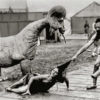Why don’t chimpanzees, our closest primate cousins, have musical ability? Scientists at örebro University in Sweden hypothesize that our musical ability developed only after we had begun to walk upright. Writing in the journal Animal Cognition, researcher Matz Larsson suggests that our musicality stems from the need to deal with the disturbing sounds that are […]








